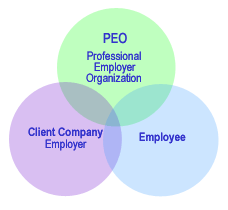PEO’s: How Your Business Can Benefit, an article from AllBusiness.com
Professional Employer Organizations: How Your Business Can Benefit
 Tam Harbert
Tam Harbert
So how do you manage all your human resources responsibilities? Even with someone on staff dedicated to HR, you’ll probably need to outsource some aspects. There are a number of options for outsourcing various elements of HR, but the professional employer organization is a sort of one-stop shop to which small and medium-size businesses are increasingly turning.
A PEO is a company that specializes in handling all the responsibilities that come with employing people. By hiring a PEO, you give yourself more time to focus on your business.
PEOs started in the 1980s and have grown quickly in the past several years as the number of state and federal regulations has increased. There are about 700 PEOs in the United States, providing approximately 2.5 million employees with benefits, according to the National Association of Professional Employer Organizations, the trade association for the PEO industry.
Co-Employment
The primary distinction from other HR service providers is that the PEO actually becomes the legal employer of your workers and thus takes on the accompanying legal liabilities.
For a fee typically ranging from 1.5 percent to 8 percent of your payroll, the PEO “co-employs” your workers. (The fee depends on a number of factors, including the number of employees and the average salary level of your employees.) Co-employment means that each party is solely responsible for some aspects of employment while sharing other aspects. PEOs can handle the whole gamut of HR responsibilities, including benefits, payroll, taxes, workers’ compensation, and regulatory compliance.
Because they take over most of the headaches of being an employer, PEOs are ideal for small businesses. In fact, most PEOs target companies that have 150 or fewer employees; the average client has 19 employees.
Frequently a PEO arrangement is the only way a small business can offer benefits such as health insurance, dental and vision care, life insurance, retirement savings plans such as 401(k), Section 125 cafeteria plans (flexible spending accounts for health care and child care), job counseling, adoption assistance, and educational benefits. Most small businesses could neither afford nor manage these benefits on their own.
PEOs can offer such benefits because they pool the employees of all their clients together. With more employees, PEOs get better benefits at better rates. A health insurer would obviously be more interested in selling a group plan for thousands of employees than for just 10.
Expert Regulatory Guidance
In addition to bringing your employees more benefits and managing these plans for you, PEOs offer expert guidance through the maze of state and federal regulations. Today there are more than 100 federal and state agencies that regulate businesses.
But PEOs do have their own regulatory issues. Typically, the PEO takes legal responsibility for matters involving HR management and compliance with employment laws. But what counts with government and regulatory agencies is the “employer of record,” and whether PEOs are accepted as the employer of record can vary depending on the government or regulatory agency. Some states don’t recognize PEOs as the employer of record. In addition, the Internal Revenue Service is trying to figure out how to handle the issue, in terms of defining who is actually the employer of the worker and thus who is ultimately responsible for withholding and reporting income and payroll taxes.
Hiring and Firing
As a co-employer, the PEO has a right to hire and fire employees, a feature that can rub independent-minded small business owners the wrong way. But the PEO needs this right in order to manage its employment liability exposure. The PEO typically monitors and requires compliance with employment laws and develops policies and procedures to ensure their compliance. If an employee isn’t complying, the PEO needs the right to discipline or fire him or her. Typically, this is done with the full knowledge and consent of the business owner, who has no desire to retain a worker who ignores regulations.
Conversely, if you want to fire a worker, you need to call the PEO first. This isn’t to get its permission but rather to ensure you’re complying with all rules and regulations relevant to the situation.
All this complexity makes the contract terms you sign with your PEO crucial. Examine the contract carefully and run it by your lawyer, preferably someone with employment law experience. The contract should be long and detailed. It should specifically spell out the PEO’s sole legal responsibilities, your company’s sole legal responsibilities, and the shared responsibilities and exactly how they are to be shared.
Professional Employer Organizations: How Your Business Can Benefit | Company Activities & Management Company Strategy from AllBusiness.com.